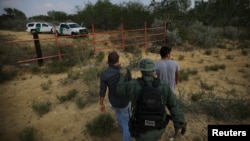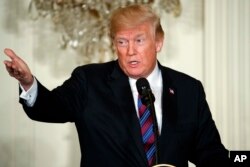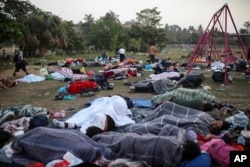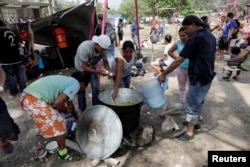Troops are to be dispatched to America’s border with Mexico to thwart further illegal immigration, U.S. President Donald Trump told reporters on Tuesday.
“I think that it’s something that we have to do,” the president said in response to a question from a reporter at the afternoon event in the White House East Room.
The president and several cabinet members, including Defense Secretary James Mattis, Homeland Security Secretary Kirsten Nielsen, and Attorney General Jeff Sessions, received a briefing Tuesday to examine his administration’s strategy.
The discussion included the mobilization of the National Guard and the need to pressure Congress to urgently pass legislation to close legal loopholes exploited by criminal trafficking, narco-terrorist and smuggling organizations.
The Pentagon responded to Trump's plan to use military to guard the borders:
"We are still consulting with the White House,” a senior defense official said, promising more information.
Mexican Foreign Minister Luis Videgaray Caso said on Twitter his government has asked the United States to clarify Trump's announcement. He wrote Mexico will define its position based on that clarification, and always in defense of its sovereignty and national interests.
Two of Trump's predecessors — George W. Bush and Barack Obama — sent National Guard units to provide intelligence, surveillance and reconnaissance support for border patrol agents.
It is not immediately clear whether Trump intends to dispatch the National Guard, which is a reserve military component composed of members or units from the individual states and territories, or regular military forces.
An opposition Democratic Party senator, Brian Schatz of Hawaii, who serves on the defense subcommittee of the Senate's appropriations committee, quickly criticized the idea, stating on Twitter that "Our military has more important things to do than to be mobilized to fulfill" a campaign promise of Trump's.
In the United States, the active-duty military is generally restricted from domestic law enforcement functions, which would include capturing people who have come across the borders.
At the news conference, the president also spoke of a "caravan" of more than 1,000 migrants from Central America that has been making a 2,000-kilometer (1,200-mile) journey from the Mexico-Guatemala border to the United States. He has mentioned the procession several times on Twitter in recent days, vowing that it must be stopped.
In the past several days, the caravan has been mentioned numerous times on the Fox News Channel, which is Trump's preferred source of broadcast news.
Those in the caravan "thought they were going to just walk right through Mexico and right through the border" into the United States, Trump said. Trump praised a quick response from Mexico, who he said was acting to ensure it is "all being broken up."
Mexico has reportedly offered refugee status to some of the migrants.
Trump earlier had warned Mexico that its free trade agreement with its northern neighbor would be jeopardized if it did not stop the caravan before it reached the U.S. border.
Securing the southern border was a centerpiece of Trump's platform during his 2016 campaign for the presidency, and something he mentions frequently.
"The Mexican border is very unprotected by our laws," Trump asserted Tuesday. "We don't have laws. We have catch and release. You catch and then you immediately release. And people come back years later for a court case, except they virtually never come back."
Trump has continually emphasized the need for a border wall — which on Tuesday he said must be "700 [1,127 kilometers] to 800 miles [1,287 kilometers] long." He previously has demanded that Mexico pay for the wall, but that has not been emphasized recently by Trump in public remarks.
"We need the wall. We've started building the wall, as you know," said Trump, adding that $1.6 billion has now been appropriated by Congress toward "building the wall and fixing the existing wall that's falling down or was never appropriated in the first place."








